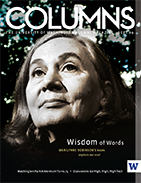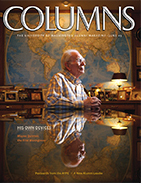Search
Current Search Filters
Sept. 2009 issue
Editor’s Eye: Authors touch our hearts, one word at a time
One of the things I particularly admire about a place as big and complex as the University of Washington is how it can touch us on an intimate manner: through the written word.
Sept. 2009 issue
Unmanned Seagliders give researchers a long look under the sea
Seagliders, under development since 1995 at the UW’s School of Oceanography and Applied Physics Laboratory, have repeatedly set world endurance and range records for autonomous underwater vehicles.
Sept. 2009 issue
Studies search for genetic clues to autism
UW scientists contributed to two recent studies that are beginning to unlock the genetic underpinnings of autism and related disorders.
Sept. 2009 issue
UW scientists lead the response against H1N1
When a new influenza virus, Influenza A H1N1, or “swine flu,” emerged last spring, Anne Marie Kimball, a professor of epidemiology and health services at UW School of Public Health, was on the front lines of the information response.
Sept. 2009 issue
Computer science tackles mysterious ancient tablets
An ancient mystery, a modern-day academic debate, and state-of-the-art computer science—these are the elements of recent research by Rajesh Rao, UW associate professor of computer science and engineering.
Sept. 2009 issue
Washington Park Arboretum celebrates 75 years of beauty
Long before it became fashionable to be green, Seattle was—and continues to be—a green city. And one of the most beloved public gardens in the city, if not the entire Pacific Northwest, is the Washington Park Arboretum.
Sept. 2009 issue
To renowned author Marilynne Robinson, each book is a revelation
Marilynne Robinson, ’68, ’77, has authored three novels, each of which is regarded as a major contribution to American letters.
Sept. 2009 issue
Pharmacy lecturer focuses on the big picture
“Where can you make the biggest difference?” It’s a question Annie Lam, ’97, senior lecturer in the University of Washington Department of Pharmacy, asks rhetorically, but her answer has been demonstrated clearly over the course of her UW career.
June 2009 issue
1909 Alaska Yukon Pacific Exhibition was a fair to remember
One hundred years ago this summer, a young University of Washington campus hosted the Alaska-Yukon-Pacific Exposition (AYPE), a world’s fair showcasing the best of the Pacific Northwest and Alaska.
June 2009 issue
Teachers of the year, 2009
The seven recipients of this year’s Distinguished Teaching Awards represent the broadest range of disciplines, from English to maxillofacial surgery. But they all have one thing in common: the ability to hold their students spellbound.
June 2009 issue
Alumna makes strides in fight to save tree kangaroos
This year, Lisa Dabek, '91, '94, scored a major victory in the fight to save tree kangaroos, securing the first-ever national preserve in Papua New Guinea.
June 2009 issue
Marquis Cooper, 1982-2009
Former Husky football standout Marquis Cooper and two other passengers aboard his 21-foot fishing boat were presumed dead March 6 after the vessel capsized in rough seas near Clearwater, Fla., five days earlier. He was 26.
June 2009 issue
Wayne Quinton’s inventions have saved countless lives
Wayne Quinton not only designed a laundry list of life-saving medical devices, but became the first practitioner of an entirely new field: bioengineering.
June 2009 issue
Kids’ sweet tooth could just be growing pains
Parents may be able to chalk up their children’s preference for the tooth-achingly sweet to growing pains. That’s the possibility raised by new research led by UW Professor of Dental Public Health Sciences Susan Coldwell.
June 2009 issue
Strange fish surprises UW professor who discovered it
When it comes to weird fish, Ted Pietsch, a UW professor of aquatic and fishery sciences and curator of fishes at the Burke Museum, has seen it all. But the creature discovered early last year off Ambon Island, in the Indonesian archipelago, surprised even him.
June 2009 issue
Washington will feel the heat from climate change, study shows
A study commissioned by the state Legislature is the most comprehensive look yet at how climate change is likely to affect the state.
June 2009 issue
Edgar Martinez goes to bat for future teachers
Last year, Seattle Mariners legend Edgar Martinez and his wife, Holli, ‘08, launched the Martinez Foundation to help students of color through scholarships and grants.
June 2009 issue
Paul Rucker, ’95, ’02, to lead UW Alumni Association
Paul Rucker, ’95, ’02, who oversaw the expansion of the University of Washington Alumni Association’s programming efforts over the past five years, has been named executive director of the 120-year-old organization.
June 2009 issue
New state budget a bitter pill for UW
For the first time in its history, the UW will be getting more money from tuition than from the state of Washington.
June 2009 issue
With Innocence Project, professor gives students some eye-opening lessons
Since 1997, when Professor Jackie McMurtrie established the Innocence Project Northwest Clinic at the UW School of Law, she and her students have helped exonerate 13 wrongfully convicted people.

